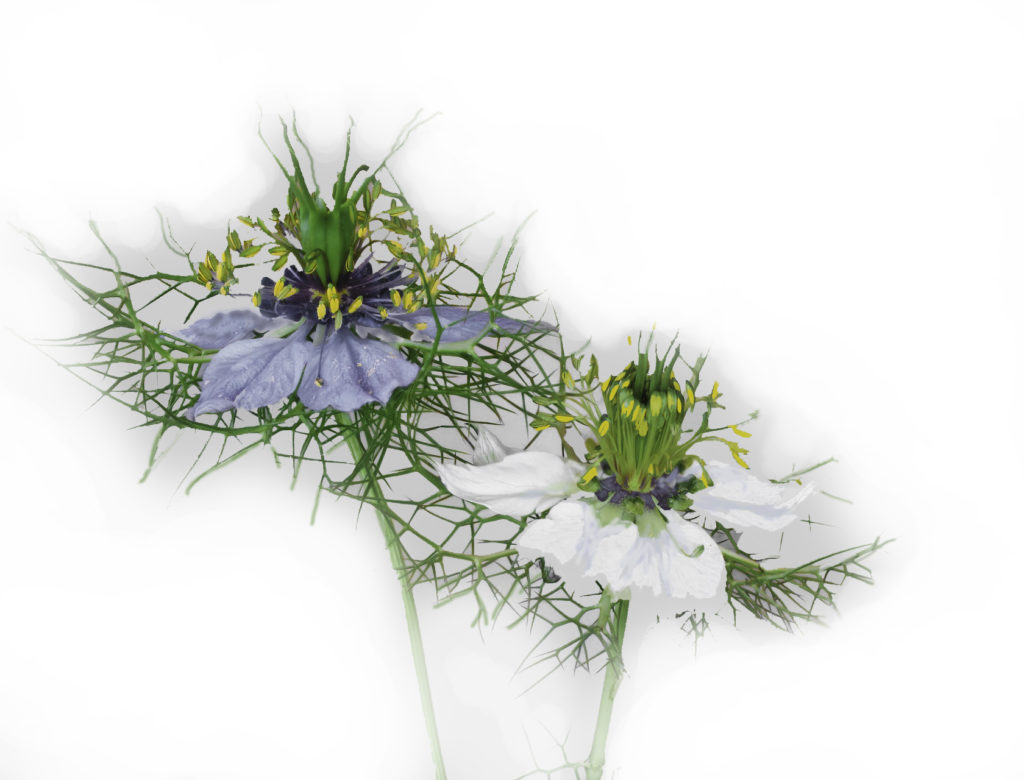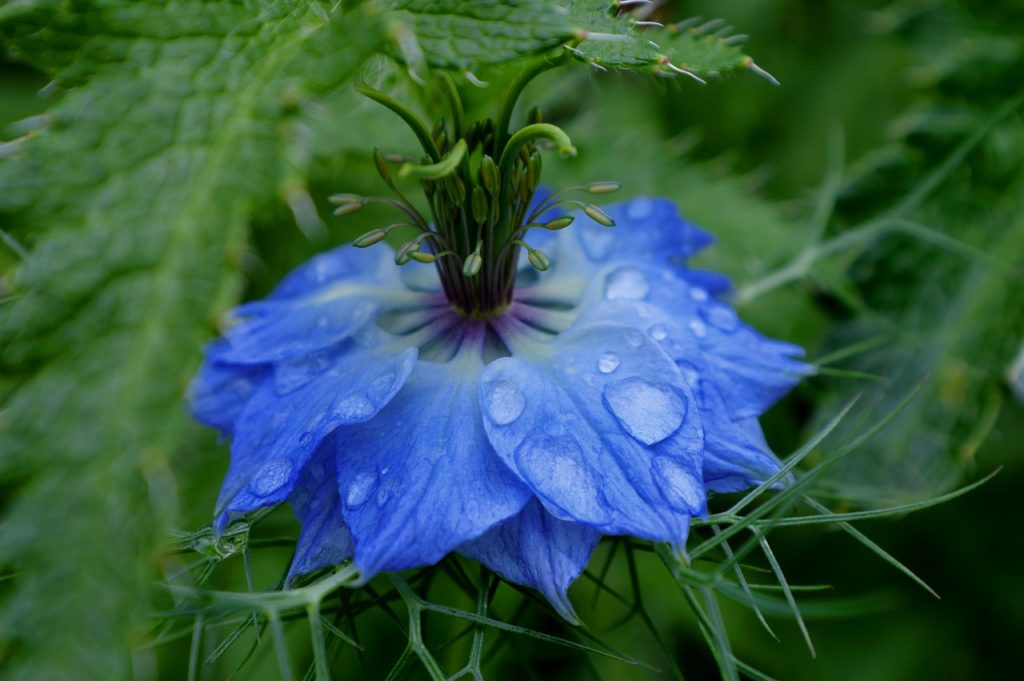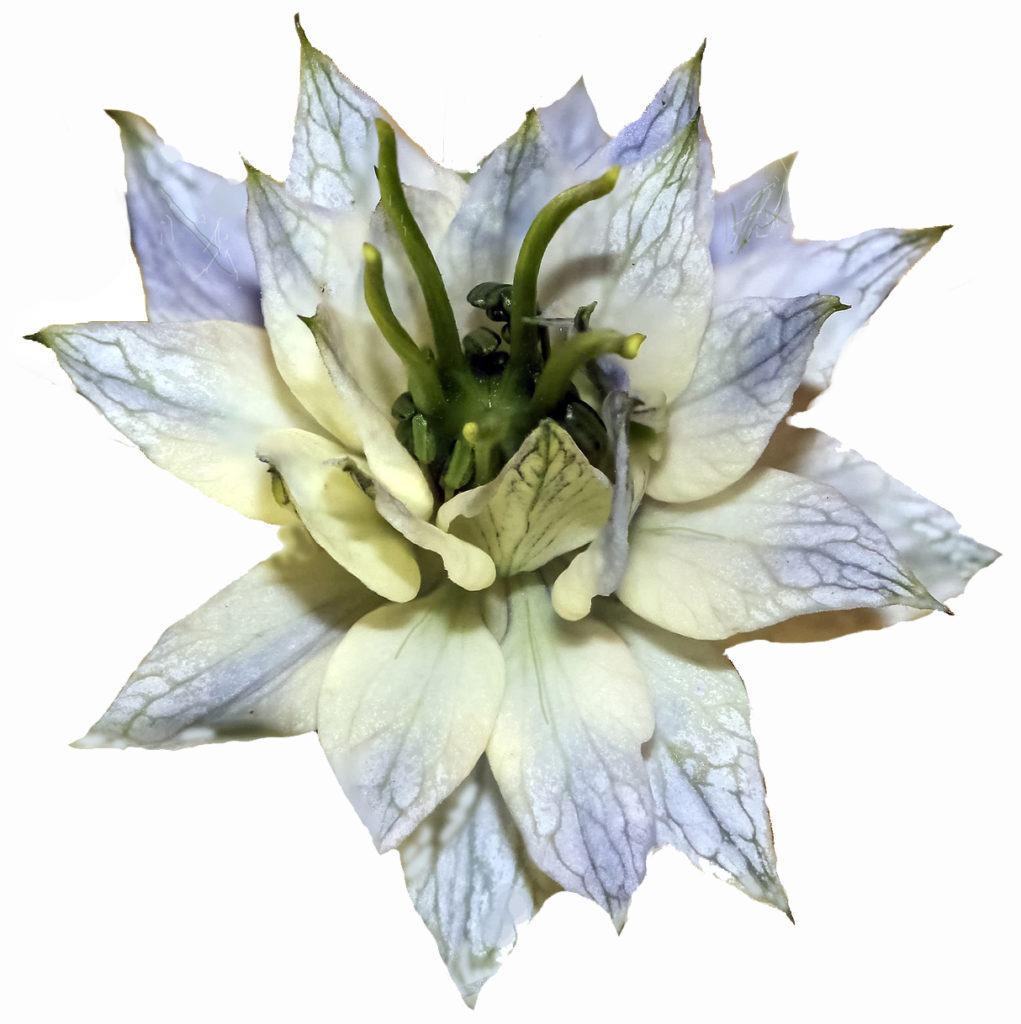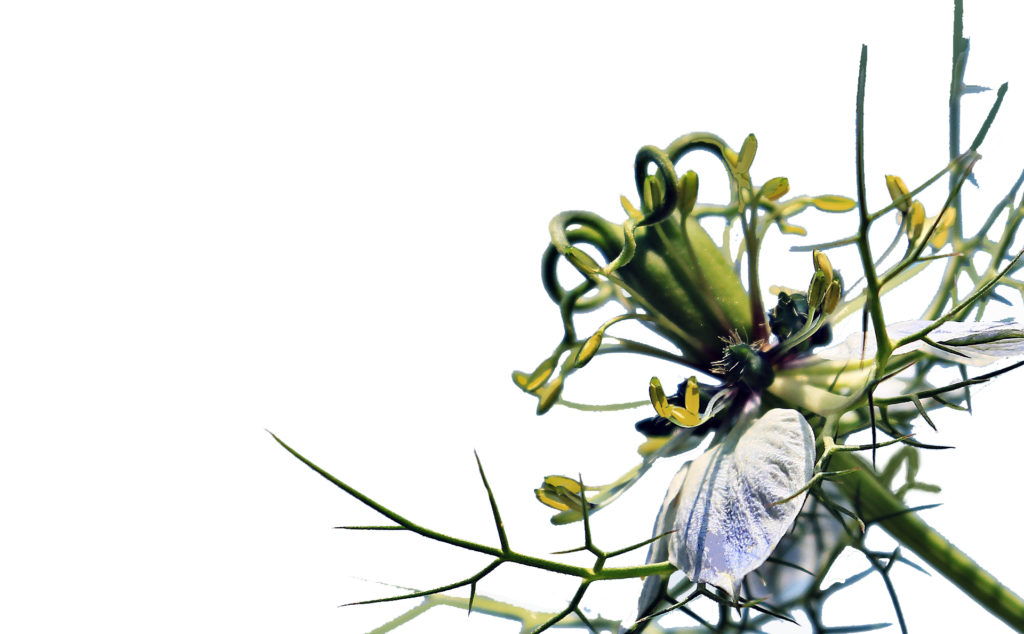Black Seed Oil, also known as Black Cumin Seed Oil, is an excellent hair conditioning and hair growth remedy. It also has skincare benefits.

Black Cumin Seed Oil comes from the seeds of this flower
About Black Cumin Seed Oil
Rich in fatty amino acids, Black Seed Oil is moisturizing to the skin and hair. It makes an excellent scalp treatment. It is an anti-inflammatory that soothes chronic skin conditions such as eczema and psoriasis. The fatty amino acids make the skin glow and give hair a natural shine.
Black Seed Oil Fast Facts

Hair enhancing Black Seed Oil comes from the seeds of Nigella sativa
Black Cumin Seed Oil or Black Seed Oil:
- comes from the seeds of the Nigella sativa, commonly called virgin in the green flower.
- is also known as Black Cumin Seed Oil
- works well with other ingredients to provide therapeutic effects.
- is an antibacterial, antifungal, anti-inflammatory, and antioxidant oil
- Black seeds and their oil have a long history of traditional medicine use in Indian and Arabian civilizations.
Black Seed Oil as a Scalp Treatment
For scalp care, Black Seed Oil contains Thymoquinone. This is an excellent antibacterial, antifungal, anti-inflammatory, and antioxidant.
Black Cumin Seed Oil makes for an excellent scalp treatment. It hydrates the scalp to keep it in optimal condition for growing healthy hair. Black Cumin Seed Oil also combats scalp conditions such as dandruff, psoriasis, and other skin conditions [1] that can impair healthy hair growth.
How to Apply Black Seed Oil as a Scalp Treatment
Mix the oil with Coconut or Olive Oil, about a 50/50 ratio.
The oil can be warmed and applied directly to the scalp with a cotton ball or nozzle applicator tip.
Massage gently into the scalp in a circular motion.
Leave the oil mixture in the hair for at least 30 minutes, but it can be left in for even a few hours.
Wash with a mild shampoo.
Black Seed Oil for HAIR GROWTH
You may have heard about this oil as a hair growth remedy. This is the case for certain types of hair growth.
Medical research studies of Telogen effluvium hair loss show topical Black Seed Oil application reduces temporary hair loss. [2]
Black Cumin Seed Oil does not directly stimulate hair growth in those within normal, healthy hair growth. But it does enable the keeping maximum hair length by combatting hair brittleness.
Hair breakage can give the appearance of slower hair growth when the hair breaks as fast or faster than it grows. By stopping hair breakage, hair retains healthy length.
It works well with other ingredients to provide therapeutic effects. It is synergistic with other humectant and moisturizing ingredients to lock moisture into the hair. Hydrated hair is more elastic and resilient to breakage than brittle hair.

Black Cumin Seed Oil from the seeds of this flower is an excellent scalp treatment
How to Use Black Seed Oil for Hair Conditioning
Mix Black Seed oil with Coconut or Olive Oil, about a 50/50 ratio.
This Oil mix can be warmed and applied to the lengths of the hair with or without a scalp treatment. Smooth the oil onto the hair with the palms of the hands, do not rub. Squeeze in extra onto the hair ends and damaged sections.
It can also be added to your favorite hair conditioner to make a hair masque. Leave the mix in the hair for an hour before rinsing. The advantage of mixing the oil into a cream conditioner is it is far easier to rinse from the hair without excessive shampooing or leaving a residue.
If possible, allow hair to dry within a towel or on a cool air setting to retain the moisture.
Ingredient Overviews
Find more hair-friendly ingredients in the Style Chicks Defining Beauty Glossary. The Defining Beauty Glossary contains many helpful ingredients for hair and skin care. And stay tuned for other Style Chicks Ingredient Overviews
References
- Salih H.M. Aljabre, et al. Dermatological effects of Nigella sativa, Journal of Dermatology & Dermatologic Surgery, Volume 19, Issue 2, 2015, Pages 92-98, ISSN 2352-2410, https://doi.org/10.1016/j.jdds.2015.04.002.
- A. Rossi, L. Priolo, A. Iorio, E. Vescarelli, M. Gerardi, D. Campo, D. Nunno, S. Ceccarelli, S. Calvieri, A. Angeloni and C. Marchese, “Evaluation of a Therapeutic Alternative for Telogen Effluvium: A Pilot Study, Journal of Cosmetics, Dermatological Sciences and Applications, Vol. 3 No. 3A, 2013, pp. 9-16. doi:10.4236/jcdsa.2013.33A1002.
About This Post
The Style Chicks personally researches each ingredient we feature. Our research comes from respected, peer reviewed medical and scientific journals. All research articles are cited in the References section.
